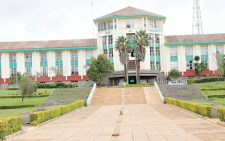Kisumu youth battle plastic waste menace
Solid waste management has been considered a major challenge in Kisumu county over the years even as stakeholders seek workable interventions.
Against this backdrop, a community-based organisation (CBO) in the lakeside town has found a better way to deal with plastic wastes that would otherwise be a menace to the community’s ecosystem.
Precious Plastic Manyatta is leading the frontier in environmental conservation efforts through plastic waste recycling.
Located within Manyatta informal settlement, the CBO is turning plastic waste into valuable new household items such as bowls, mugs, lamp shades, flower vases, door knobs, beads and earrings.
“We landed this project after going through successful training on plastic waste management. The objective is to keep the environment free from plastics,” says Edwin Okoth, the team’s supervisor.
The young people, who are majorly Form Four leavers yet to join college and university, operate the plastic recycling facility and get token for the work done.
“Plastics are not biodegradable— they don’t decompose— hence the best thing you can do is recycle them,” states Okoth.
He says production runs for four days a week and a day is set aside for cleaning plastics after collection.
The CBO buys raw plastic materials from the community, nearby schools and institutions and dumpsites. A kilo goes for about Sh20 and for routine production, it can use between 80 and 100 kg of plastic materials at ago.
Prices for the products range from Sh20 to Sh300. The products are sold at public events, the organisation’s showcase room, hotels, supermarkets, friends and partner networks.
“The products we make are an indication that plastic is money; it is a precious commodity and not trash that should be thrown away to the dustbin,” explains Okoth, adding there is positive feedback from buyers.
Gradual takeover
Okoth predicts the venture will generate between Sh50,000 and Sh60,000 monthly once their products are fully embraced in the market.
For sustainability purposes, he says they are training other youths to gradually take over when the current team leaves to pursue further education.
Okoth points at marketing as major challenge, saying products coming from the facility are yet to find a market.
Debra Anyango, an operator in the CBO, says the initiative is a source of fortune for young people besides being pivotal in championing the environmental conservation plan.
Anyango says through the project they have been actively engaged, especially during the pandemic.
“Besides contributing positively to economic empowerment, the community now boasts of clean surrounding; plastics are not scattered all over as it was the case before,” she says.
The recycling process starts with collection of raw plastic wastes. They are then washed to ensure clean by-products, before they are sorted by colour and type such as Polythylene terephthalate (PET), Polypropylene (PP), High Density Polyethylene (HDP) and Polyvinyl Chloride (PVC).
The materials are then resized by breaking them into smaller pieces to make it easier for shredding and moved into either the injection or extrusion machine to make various products.
During production the extruder is fixed with specific molds at a time to produce various items.
Rev Danis Odhiambo of Manyatta Baptist church says the project is a game-changer to the community as it is contributing immensely in terms of sanitation and economic empowerment efforts.
Reusing plastics
“While undertaking our evangelism mission, we saw how dirty it was. This propelled us to think of how we can initiate ways of reusing plastics within our church compound,” recalls Odhiambo.
“The objective was to make sure our surrounding is clean without plastics thrown about carelessly. We also looked at it as a source of income for the church which is yet to be realised.”
The pastor says Manyatta community has so far embraced the project because of the kind of transformation it has brought.
“We also sensitise the community on the importance of reusing plastic waste so that they can adopt this approach.
We believe this will go a long way in promoting sanitation and healthy living,” he says.
While the venture is yet to break even, Odhiambo is optimistic their products will find reliable market.
“Our prayer is to connect with people who can buy the materials we generate from the plastic waste we have recycled,” adds Odhiambo.
Kisumu county National Environmental Management Authority (Nema) director Tom Togo says some plastic waste find its way into Lake Victoria.
”This shows how people are not careful in the manner they handle plastic materials after use,” explains Togo.
Consequently, he says the plastic waste recycling is a welcomed initiative as it promotes environmental conservation efforts.
“Any deliberate effort to recover plastic waste from the environment is welcomed by Nema as this will significantly promote sanitation,” he says.










